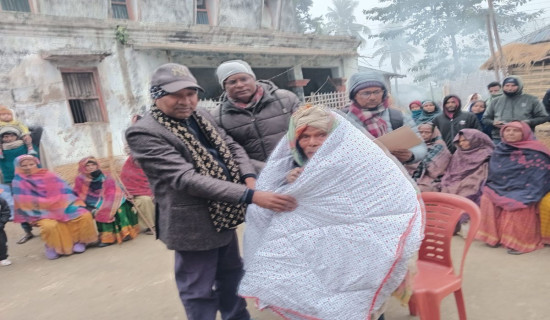- Thursday, 8 January 2026
Anti-graft Drive
Since corruption weakens democracy and impedes the entire economic development process, it is essential for every nation to tackle this social evil once and for all. Corruption is an abuse of delegated power and authority for private gain. Public bodies and institutions lose people’s trust when their activities are not transparent. Those holding public positions are supposed to carry out their responsibilities in an accountable manner. But many public officials are not found abiding by the principle of accountability in the course of performing their duties. Integrity, rule of law, moral-based decision-making and participation are other key values of good governance. When corruption thrives in any society, it leads to inequality, mass frustration, social divisions and a host of other problems. Bearing all this in view, the Constitution of Nepal, 2015 envisions the rule of law, transparency and accountability which are inalienable elements of good governance.
It is needless to mention that corruption has been deep rooted even in our society with consistent abuse of authority in public services as well as business transactions and other dealings. Those who have amassed wealth by illegal and immoral means have still higher social status as compared to others in our society. This is one of the key reasons behind the continuation of corrupt practices in the country. Controlling corruption is an important part of governance and effective management. Corruption has continued to become a stumbling block to all the endeavours geared towards the goal of achieving overall development and prosperity. In this regard, the Commission for the Investigation of Abuse of Authority (CIAA) has been working to curb corruption in the country. This constitutional body has been authorised to investigate cases against persons holding any public office and their aides involved in the abuse of authority and indict them as per the law of the land.
The anti-graft commission plays its role as an investigator as well as prosecutor. Its main functions include detecting corruption and filing cases against those involved in such illegal activities in the court. It also contributes towards making social, cultural and institutional reforms. Recently, the CIAA caught an official working with the Ministry of Culture, Tourism and Civil Aviation red-handed with Rs. 2.25 million in bribe money. The CIAA’s team nabbed him with Rs. 600,000 while an extra Rs. 1.6 million was found in a government vehicle used by him, according to a press statement issued by the anti-corruption body. Under Secretary Pramod Nepal was arrested with the money from a hotel located in Naxal of Kathmandu. Based on confidential information that the official was demanding the bribe for a paragliding license, a CIAA team arrested him.
What is more ironic is that the charged official, a Tribhuvan University gold medalist in economics, was also among a dozen Nepali scholars to receive the prominent Chevening Scholarship from the British government two years ago. His arrest is an indication that corruption may be happening in most unexpected places. The CIAA catches some government officials and others on charge of abuse of authority almost on a daily basis. On Wednesday also, the anti-corruption watchdog arrested a computer operator Bindu Shrestha Pradhan with Rs. 30,000 in grant from the Inland Revenue Office based in Lazimpat. The government, political parties and civil society must extend their full cooperation to the CIAA for controlling corruption.

















